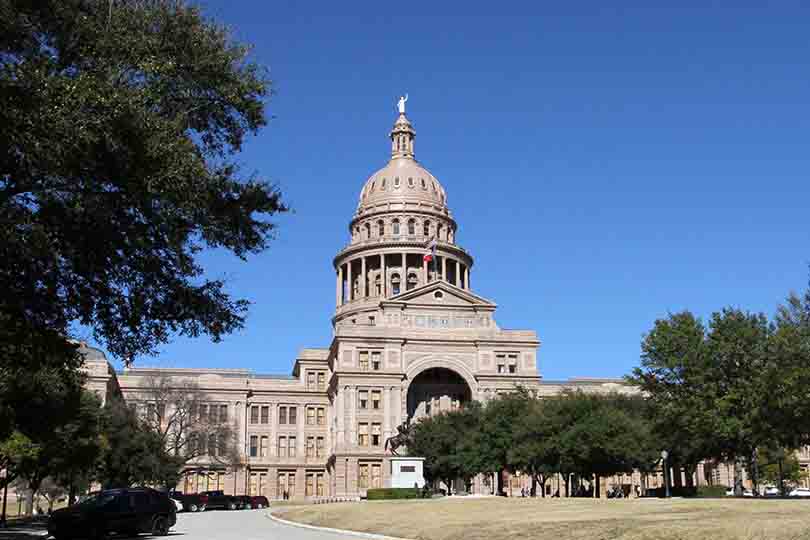By Jennifer Dorsett
Field Editor
In a webinar hosted by Texas Farm Bureau (TFB), attendees heard from Texas Comptroller Glenn Hegar and State Sen. Lois Kolkhorst on the upcoming legislative session and economic issues in today’s uncertain times.
Property taxes, agricultural valuations of land and priority issues in the next legislative session were discussed, as well as Texas’ revenue estimate for the remainder of the biennial budget and what that means for Texans.
“We all know the effect the COVID-19 pandemic has had on our state and our economy,” TFB President Russell Boening said. “How the Legislature will deal with the results of a budget shortfall and coming together to conduct our legislative business is of utmost importance to us as Texans, as farmers and ranchers and as a grassroots organization that visits the Capitol during legislative sessions.”
Hegar opened the discussion by providing information on the state’s current budget cycle, which runs from August 2019 to August 2021.
“If you look at the current two-year budget the legislature put together, we had forecasted at the end of last year that the budget would end with roughly a $3 billion surplus. There was an extra amount of money coming into the state than was necessary for the expenses on which the legislature had put together,” Hegar said. “As of February of this year, we were tracking slightly ahead of that estimate, so revenues were coming in a little bit stronger than we had anticipated.”
But COVID-19 had a profound impact on the Texas economy, and it has been felt in the revenue estimate for the remainder of the budget year, he said.
“Then the dual headwinds here in Texas of not only having oil and gas prices and production volumes drop so drastically in March, but more importantly, the impact across the entire state of the COVID pandemic…Instead of having roughly a $3 billion surplus, a cushion for the current two-year budget, that swung to a roughly $4.6 billion shortfall for the current budget,” Hegar said.
An increase in oil prices would help, but there would need to be an increase in production, as well. Hegar said restoring economic confidence among consumers and finding approaches to reestablish the previously vibrant Texas economy are crucial.
To assist in shrinking the budget shortfall, state agencies across Texas will have to reduce expenses, Kolkhorst added.
“What we have to do, especially when people are hurting and out of jobs, is tighten our belt,” she said. “The speaker, lieutenant governor and the governor have asked agencies to start doing so right now, so we can realize those savings.”
That may come in the form of cuts in services or higher fees for services from state agencies, she noted.
The elected officials discussed property tax appraisals and agricultural use valuations, with Hegar noting his office is tasked with three roles in the property taxation process.
The comptroller’s office is required by state legislation to provide information to property owners on protesting property tax appraisals, update the agricultural valuation manual every year, audit half of the state’s appraisal districts each year and to assist in the finance of public education through state revenue.
There was some legislative reform to skyrocketing property tax appraisals during the last legislative session, Kolkhorst said. But a bill created by lawmakers to address the issue did not take into account reappraisals in the face of severe economic damages, such as what has happened due to COVID-19.
“There was an exception in the bill that allowed for a disaster declaration. So the real question is, is a pandemic a disaster? In all of our minds, we were thinking Hurricane Harvey. No one saw the pandemic back in May 2019,” Kolkhorst said. “So this is going to be a real fight between the cities and the counties and lawmakers and what the interpretation of that is, could end up in the courts. I wish we could do reappraisals on all of our houses, but the bill that we passed does not allow for that because it wasn’t physical damage to your home.”
The upcoming 87th Texas Legislature, slated to begin Jan. 12, 2021, will look different than previous sessions due to COVID-19, Kolkhorst and Hegar agreed. But Kolkhorst added no matter what, Texans should still speak up and fight for issues important to them.
“It is the people’s right to have their voices heard every other year for 140 days,” Kolkhorst said. “We cannot quell the voices of the people, so I say, ‘Let’s get back to work.’”
She encouraged TFB members to remain engaged in the legislative process, even if traditional measures such as visiting lawmakers at their Capitol offices are temporarily suspended.
Boening concluded the webinar by stating TFB will continue its legacy of grassroots advocacy and that the organization would continue in its fight for eminent domain reform during the upcoming session.
“This pandemic is creating challenges that we couldn’t have imagined as a state, as a community, but I think we’re confident that we have leaders like Comptroller Hegar and Senator Kolkhorst, who will help us meet those challenges,” Boening said. “And I’m confident that all of you Texas Farm Bureau members will help us meet that challenge. We hope that these online webinars are a good example, and we hope that they help us as an organization to meet those challenges, even under these extraordinary circumstances.”

